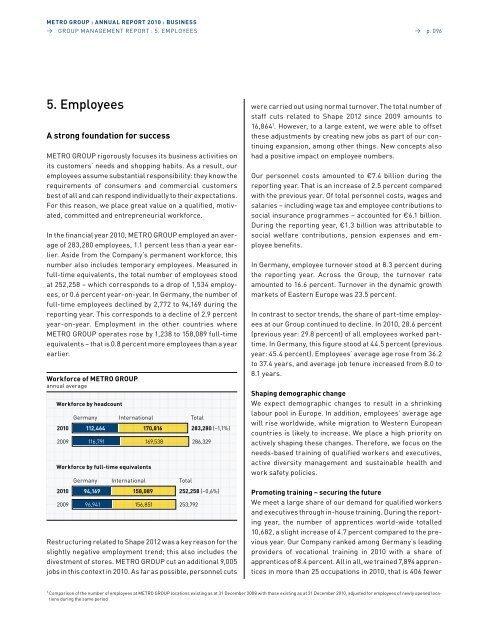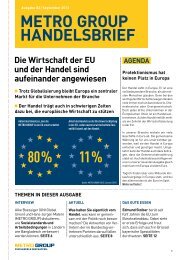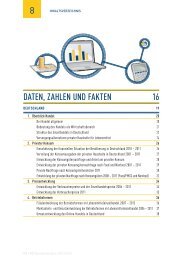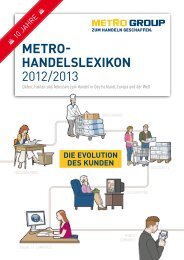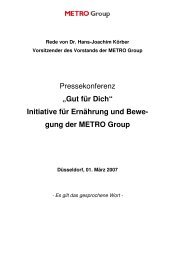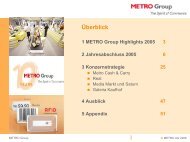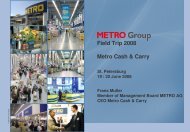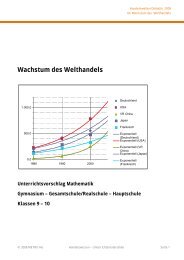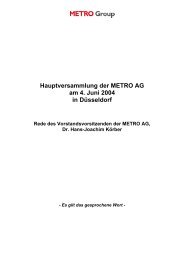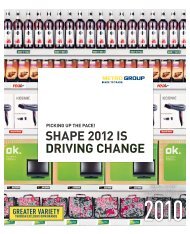pdf (2.5 MB) - METRO Group
pdf (2.5 MB) - METRO Group
pdf (2.5 MB) - METRO Group
You also want an ePaper? Increase the reach of your titles
YUMPU automatically turns print PDFs into web optimized ePapers that Google loves.
<strong>METRO</strong> GROUP : ANNUAL REPORT 2010 : BUSINESS<br />
→ GROUP MANAGEMENT REPORT : 5. EMPLOyEES<br />
5. Employees<br />
A strong foundation for success<br />
<strong>METRO</strong> GROUP rigorously focuses its business activities on<br />
its customers’ needs and shopping habits. As a result, our<br />
employees assume substantial responsibility: they know the<br />
requirements of consumers and commercial customers<br />
best of all and can respond individually to their expectations.<br />
For this reason, we place great value on a qualified, motivated,<br />
committed and entrepreneurial workforce.<br />
In the financial year 2010, <strong>METRO</strong> GROUP employed an average<br />
of 283,280 employees, 1.1 percent less than a year earlier.<br />
Aside from the Company’s permanent workforce, this<br />
number also includes temporary employees. Measured in<br />
full-time equivalents, the total number of employees stood<br />
at 252,258 – which corresponds to a drop of 1,534 employees,<br />
or 0.6 percent year-on-year. In Germany, the number of<br />
full-time employees declined by 2,772 to 94,169 during the<br />
reporting year. This corresponds to a decline of 2.9 percent<br />
year-on-year. Employment in the other countries where<br />
<strong>METRO</strong> GROUP operates rose by 1,238 to 158,089 full-time<br />
equivalents – that is 0.8 percent more employees than a year<br />
earlier.<br />
Workforce of <strong>METRO</strong> GROUP<br />
annual average<br />
Workforce by headcount<br />
2010<br />
2009<br />
Germany International<br />
Total<br />
112,464 170,816<br />
283,280 (–1,1%)<br />
Workforce by full-time equivalents<br />
2010<br />
2009<br />
116,791 169,538<br />
286,329<br />
Germany International<br />
Total<br />
94,169 158,089 252,258 (–0,6%)<br />
96,941 156,851<br />
253,792<br />
Restructuring related to Shape 2012 was a key reason for the<br />
slightly negative employment trend; this also includes the<br />
divestment of stores. <strong>METRO</strong> GROUP cut an additional 9,005<br />
jobs in this context in 2010. As far as possible, personnel cuts<br />
→ p. 096<br />
were carried out using normal turnover. The total number of<br />
staff cuts related to Shape 2012 since 2009 amounts to<br />
16,864 1 . however, to a large extent, we were able to offset<br />
these adjustments by creating new jobs as part of our continuing<br />
expansion, among other things. New concepts also<br />
had a positive impact on employee numbers.<br />
Our personnel costs amounted to €7.4 billion during the<br />
reporting year. That is an increase of <strong>2.5</strong> percent compared<br />
with the previous year. Of total personnel costs, wages and<br />
salaries – including wage tax and employee contributions to<br />
social insurance programmes – accounted for €6.1 billion.<br />
during the reporting year, €1.3 billion was attributable to<br />
social welfare contributions, pension expenses and employee<br />
benefits.<br />
In Germany, employee turnover stood at 8.3 percent during<br />
the reporting year. Across the <strong>Group</strong>, the turnover rate<br />
amounted to 16.6 percent. Turnover in the dynamic growth<br />
markets of Eastern Europe was 23.5 percent.<br />
In contrast to sector trends, the share of part-time employees<br />
at our <strong>Group</strong> continued to decline. In 2010, 28.6 percent<br />
(previous year: 29.8 percent) of all employees worked parttime.<br />
In Germany, this figure stood at 44.5 percent (previous<br />
year: 45.4 percent). Employees’ average age rose from 36.2<br />
to 37.4 years, and average job tenure increased from 8.0 to<br />
8.1 years.<br />
Shaping demographic change<br />
we expect demographic changes to result in a shrinking<br />
labour pool in Europe. In addition, employees’ average age<br />
will rise worldwide, while migration to western European<br />
countries is likely to increase. we place a high priority on<br />
actively shaping these changes. Therefore, we focus on the<br />
needs-based training of qualified workers and executives,<br />
active diversity management and sustainable health and<br />
work safety policies.<br />
Promoting training – securing the future<br />
we meet a large share of our demand for qualified workers<br />
and executives through in-house training. during the reporting<br />
year, the number of apprentices world-wide totalled<br />
10,682, a slight increase of 4.7 percent compared to the previous<br />
year. Our Company ranked among Germany’s leading<br />
providers of vocational training in 2010 with a share of<br />
apprentices of 8.4 percent. All in all, we trained 7,894 apprentices<br />
in more than 25 occupations in 2010, that is 406 fewer<br />
1 Comparison of the number of employees at <strong>METRO</strong> GROUP locations existing as at 31 december 2008 with those existing as at 31 december 2010, adjusted for employees of newly opened locations<br />
during the same period


